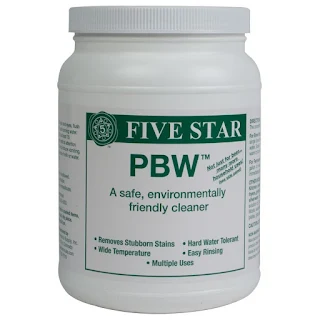PBW stands for Powdered Brewery Wash
PBW by Five Star originated in commercial breweries like Coors then found its way into homebrew circles for its unique blend of sodium metasilicate, sodium percarbonate and nonionic surfactants. That trio saponifies fats, chelates minerals and lifts proteins and hop oils from metal surfaces.
Don’t take our word for it. Hunt “PBW review” online or scan brewing forums and you’ll see pro brewers and hobbyists alike credit PBW with stripping rock-hard trub and beerstone without harsh fumes or steel pitting.
🧼 The benefits of using PBW are many
Best For: Beerstone, trub, organic residues, label removal
- Burnt-on trub dissolves as sodium metasilicate converts fats into soap—run at 60–70 °C for faster action and shorter soak times.
- Beerstone (calcium oxalate) chelates into solution, outperforming pure acid cleaners on tenacious mineral scale.
- Gentle pH balance and nonionic surfactants prevent metal corrosion—ideal for stainless steel, glass, plastics and rubber.
- Biodegradable percarbonate makes PBW septic-safe and eco-friendly—rinse water can go straight down the drain.
- Sodium percarbonate doubles as a laundry booster—brands like Napisan and OxiClean share its formula, so DIY alternatives abound.
- Mild on skin compared to sodium hydroxide, though protective gloves and goggles still advised for concentrated soaks.
- Peels labels effortlessly: soak bottles overnight to remove adhesive and paper fibers without aggressive scraping.
🔬 PBW has plenty of uses you might not expect
Left dried krausen and spent yeast in bottles? A few hours in PBW solution flushes out sediment your brush can’t touch.
Forgot to clean that fermenter until residue hardened like Fort Knox? A full-strength overnight soak then a hose rinse restores it without a brush.
Dishwashers and washing machines benefit too—run an empty hot cycle with PBW to clear grease, soap scum and funky odors.
⚙️ It’s really easy to use PBW
Method: Hot water soak, 4–12 hours, rinse
- Heat water to 50–70 °C, stir in PBW until dissolved.
- Submerge equipment fully. Agitation or gentle swirling accelerates penetration.
- After 4–12 hours, drain and rinse thoroughly—no scrubbing needed.
💬 So what do other users say?
Amazon reviewers give PBW 5 out of 5, praising its ability to cut through protein, wort sugars and hop oils in one go.
🧹 PBW is not a sanitizer
PBW removes soils, it doesn’t kill microbes. After cleaning, switch to a no-rinse acid sanitizer like Star San to avoid contamination.
🔍 Active ingredients in PBW
Sodium Metasilicate (≈30 %): Turns fats into soap, breaks protein bonds and disperses mineral scale.
Sodium Percarbonate: Releases oxygen for oxidation cleaning and chelation; also sold as laundry booster.
DIY substitute: Blend 30 % TSP/90 (Red Devil) with 70 % OxiClean for a close match to PBW’s dual-action formula.
🛁 Soaking kettles and pots
Neglected trub can bake onto your brew kettle. PBW at 1–2 oz/gal and 60 °C for 6–8 hours dissolves organic deposits, protein films and beerstone so you can rinse with a hose and be ready to brew.
🏠 Other household uses
Clean kitchen appliances—stove tops, oven trays and fridge interiors—by applying PBW solution with a cloth, then rinsing.
For a deep dishwasher clean, run an empty hot cycle with PBW to lift grease and clear spray arms.
📊 Pros and Cons
| Pros | Cons |
|---|---|
| Effective Cleaning Dissolves organic residues and beerstone | Cost Pricier than generic cleaners |
| Safe on Materials Gentle on steel, glass, plastic and rubber | Safety Precautions Gloves and eye protection recommended |
| Non-Hazardous Formula Biodegradable, no harsh fumes | Environmental Disposal Requires proper rinse disposal |
| No Scrubbing Oxygen-powered action lifts soils | Rinsing Needed Thorough rinse necessary to prevent off-flavors |
| Versatility Cleans kegs, fermenters, laundry machines and more | Preparation Must monitor temperature and concentration |
🛒 Where to buy PBW
Find PBW on Amazon in multiple sizes—ideal for occasional hobbyists or brewery-scale use.
❓ Acid sanitizers vs Covid-19?
Star San’s low-pH, phosphoric acid formula can inactivate enveloped viruses in lab settings, but it isn’t certified for medical disinfection. Always follow CDC guidelines and use approved hospital-grade disinfectants for virus control.
For brewing, stick to PBW for cleaning and Star San for sanitizing—neither replaces a dedicated virucidal agent in healthcare scenarios.

It is also magic for kitchen pots and pans. I have a beautiful Le Creuset I thought i had ruined beyond repair. PBW soak and it looks brand new.
ReplyDeleteThis comment has been removed by a blog administrator.
ReplyDelete